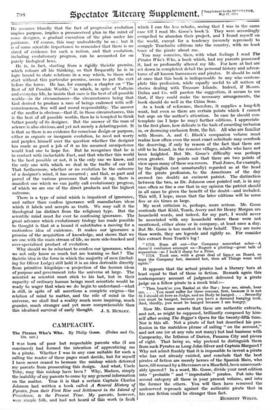CAMPEACHY.
The Pirates Who's Who. By Philip Goose. (Dulau and Co. 10s. net.) I was born of poor but respectable parents who (I am convinced) had formed the intention of apprenticing me to a pirate. Whether I was in any case suitable for such a calling the reader of these pages must decide, but for myself I have never ceased to bemoan the mishap which deterred my parents from prosecuting this design. And what, Uncle Toby, may this mishap have been ? Why, Madam, simply the inability of my parents to come by any general information on the matter. True it is that a certain Captain Charles Johnson had written a book called A general History of Pyrates, from their First Rise and Settlement in the Island of Providence, to the Present Time. My parents, however, were simple- folk, and had not heard of this work (a fault which I can the less rebuke, seeing that I was in the same case till I read Mr. Gosse's book !). They were accordingly compelled to abandon their project, and I found myself on
the world, except for a tendency (severely repressed) to smuggle Tauchnitz editions into the country, with no least trace of the pirate about me.
You may conceive, then, with what feelings I read The Pirates Who's Who, a book which, had my parents possessed it, had so profoundly altered my life. For here at last are
set down in completest detail the personal history and adven- tures of all known buccaneers and pirates. It should be said at once that this book is indispensable to any who contem- plate this profession, while equally useful to all writers of stories dealing with Treasure Islands. Indeed, if Messrs. Dulau and Co. will pardon the suggestion, it occurs to me that, if they could make the necessary arrangements, the book should do well in the China Seas.
As a book of reference, therefore, it supplies a long-felt
want, but even so there are certain points which I cannot but urge on the author's attention. In case he should con- template (as I hope he may) further editions, I appreciate in the first place, how delicate is the task of awarding inclusion in, or decreeing exclusion from, the list. All who are fax&liar with Messrs. A. and C. Black's companion volume must realize how often even the most exact solicitude may overlook the deserving, if only by reason of the fact that there are
still to be found, in the remoter villages, adults who have not been knighted. But Mr. Gosse's difficulty was perhaps even greater. He points out that there are two points of view upon many of these sea-rovers. Paul Jones, for example, by the English (not unnaturally) regarded as at the head of the pirate profession, to the Americans of the day seemed (no doubt) an eminent patriot. The distinction between the two, as Dr. Johnson once pointed out, is in any case often so fine a one that in my opinion the patriot should in all cases be given the benefit of the doubt—and included.
This will, I hope, mean that the later editions will be some five or six times as large.
My next criticism is, perhaps, more serious. Mr. Gosse
contends that Kidd, Teach, Avery and Sir Henry Morgan are household words, and indeed, for my part, I would never be associated with any household where these were not mentioned, either alone or in company, at least once a day. But Mr. Gosse is too modest in their behalf. They are more than words, they are legends and rightly so. For consider this extract from Teach's log !
" 1718. Rum all out—Our Company somewhat sober—A damn'd confusion amongst us—Rogues a plotting—great talk of separation—so I look'd sharp for a Prize.
1718. Took one, with a great deal of liquor on Board, so kept the Company hot, damned hot, then all Things went well again."
It appears that the actual pirates had a literary turn at least equal to that of those in fiction. Remark again this
contemporary account of judgment delivered by a pirate judge on a fellow pirate in a mock trial :—
" Then heark'ee you Raskal at the Bar ; hear me, sirrah, hear me. . . . You must suffer for three reasons, first, because it is not fit I should sit here as Judge, and no Body be hanged.. . . Secondly you must be hanged, because you have a damned hanging look. And, thirdly, you must be hanged because I am hungry."
Now Mr. Gosse asserts that these are authentic extracts, and not, as might be supposed, brilliantly composed by him-
self after seeing The Beggar's Opera for the twenty-fifth time. Nor is this all. Not a pirate of fact but described his pro-
fession in the matchless phrase of sailing " on the account," and not one (or at any rate not many) but had business with Campeachy, the Isthmus of Darien, Panama City and pieces of eight. That being so, why pretend to distinguish them from such Pyrates as Long John Silver and Captain Margaret ? Why not admit frankly that it is impossible to invent a pirate who has not already existed, and conclude that the best pirates of fiction are merely heroes of the Spanish Main, who have, till rescued by a Stevenson or a Masefield, been unaccount- ably ignored ? In a word, Mr. Gosse, divide your next edition into " probable " and " improbable " pirates. Put into the second category all those in your present volume, and into the former the others. You will then have removed the undeserved reproach against the authentic pirate that in his case fiction could be stranger than fact.
HUMBERT WOLFE.


















































 Previous page
Previous page